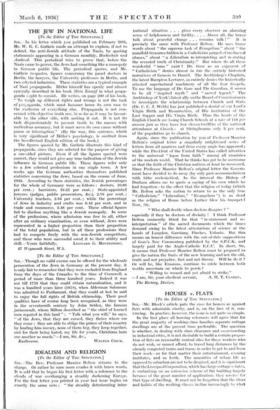THE JEW IN NATIONAL LIFE
[To the Editor of TILE SPECTATOR.] Sza,—In his letter. which you published on February 28th, Mr. W. K. C. Guthrie made an attempt to explain, if not to defend, the anti-Jewish attitude of the Nazis, by quoting statements appearing in a German monthly, Hochschule and Auslaizd. This periodical tries to prove that, before the Nazis came to power, the Jews had something like a monopoly in German public life. The periodical quotes, and Mr. Guthrie re-quotes, figures concerning the panel doctors in Berlin, the lawyers, the University professors in Berlin, and two selected industries. These statistics are a typical example of Nazi propaganda. Hitler himself has openly and almost cynically described in his book Mein Kampf in what propa- ganda cught to consist. He writes, on page 200 of his book, " To weigh up different rights and wrongs is not the task of propaganda, which must hammer home its own case to the exclusion of everything else. Propaganda is not con- cerned with objective truth nor, in so far as it may be favour- able to the other side, with seeking it out. It is not its task dispassionately to present truth to the masses with meticulous accuracy, but it must serve its own cause without pause or interruption." (By the way, this sentence, which is very significant of Hitler's psychology, is omitted from
the bowdlerised English edition of the book.) •
The figures quoted by Mr. Guthrie illustrate this kind of propaganda, since they are selected for the purpose of giving a one-sided picture. Even if all the figures quoted were correct, they would not give any true indication of the Jewish influence in German public life. These figures refer only to a few selected professions in one single town. A few weeks ago the German authorities themselves published statistics concerning the Jews, based on the census of June, 1933. According to these statistics, the Jewish percentages for the whole of Germany were as follows : doctors, 10.88 per cent. ; barristers, 16.25 per cent. ; State:appointed lawyers (judges, public prosecutors, &c.), 2.76 per cent. ; University teachers, 2.64 per cent. ; while the percentage of Jews in industry and crafts was 0.43 per cent. and in trade and commerce, 2.48 per cent. These official figures fail to disclose anything like a Jewish monopoly. In some of the professions, where admission was free to all, either after an ordinary examination, or even without, Jews were represented in a higher proportion than their proportion of the total population, but in all these professions they had to compete freely with the non-Jewish competitors, and those who were successful owed it to their ability and
















































 Previous page
Previous page